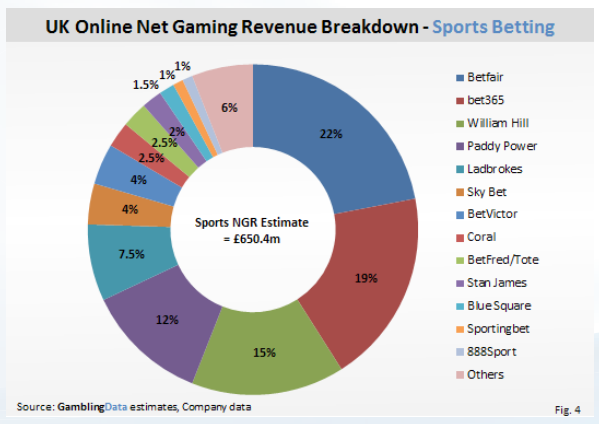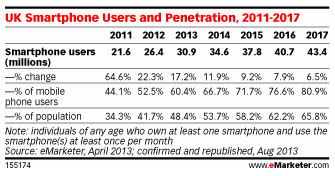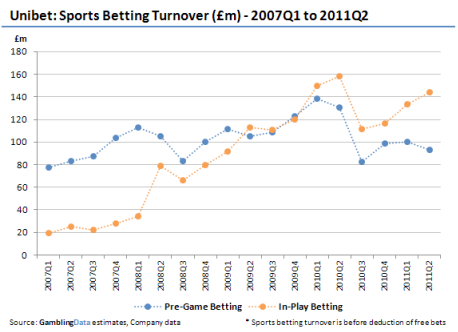An Investigation into the UK’s Mobile Betting Industry and How it Grew by more than 100% in 2014
 According Paddy Power CEO Patrick Kennedy, mobile betting is the fastest growing market the UK gaming industry. According to Juniper Research, more than $45 billion (£27 billion) in sports bets will be placed via mobile devices by 2017.
According Paddy Power CEO Patrick Kennedy, mobile betting is the fastest growing market the UK gaming industry. According to Juniper Research, more than $45 billion (£27 billion) in sports bets will be placed via mobile devices by 2017.
However, at OddsWinner.com we wanted to investigate to what extent the mobile betting industry is growing and the primary reasons for it.
In our research, we studied five of the UK’s leading bookmakers and analyzed their mobile growth, marketing campaigns and in-play betting services.
1. Mobile Growth of the UK’s Top 5 Sports Betting Operators
First of all, we need to examine the growth of mobile betting in the UK.
The top five bookmakers make up the lion’s share (61%) of the UK gambling industry, with a total net gaming revenue (NGR) of around £859 million in 2014. This is in line with the UK Gambling Commission’s estimation of the remote gambling industry being worth £795 million in 2011.
1.2 William Hill: William Hill is the UK’s largest gambling operator with £252 net gaming revenue and a 15% market share. Its public accounts from 2014 showed that 26% of sportsbook turnover was from mobile betting, however this increased to 33% in Q2 2014. The CEO of William Hill said that he had planned for this to grow to 40% by the end of the year. William Hill’s mobile betting revenues increased 298% in 2014.
1.2 Betfair: Betfair is the UK’s largest sports betting exchange and second largest gambling operator with 11% market share and £183 net gaming revenue. Betfair reported £2.2 billion in turnover from mobile bets in 2014 with a 64% increase in mobile activity since 2014.
1.3 Bet365: As a purely digital operator, Bet365 has a 9% market share and £184 million net gaming revenue in 2014. During 2014, Bet365’s mobile wager activity increased 150% and 50% of its customers now come from a mobile device.
1.4 Paddy Power: Paddy Power has risen rapidly over the last few years to grab an 8% market share of the UK’s gambling industry. According to Paddy Power’s CEO, their mobile revenues now make up 51% of betting turnover in 2014, up from just 22% the previous year. They reported generated £535 million from mobile in the first half of 2014. According to Paddy Power’s public accounts, mobile betting revenues increased 112% in 2014.
1.5 Ladbrokes: Ladbrokes (£126 million NGR) is growing at a slower pace then many of the firms around it due to its delayed launch of mobile services, however its mobile revenues nearly doubled (94%) in 2014 and its newly launched mobile platform in early 2014 should help it get off the ground.
2. Why Has Mobile Betting Grown so Quickly in the UK?
There are a number of factors to take into account in the growth of the UK betting market.
2.1 Increasing Penetration of Smart Phone Usage in the UK
Depending on which reports you look at, over half of the UK populations in 2014 own a smart phone. This is one of the highest penetration rates for any country in the world. Interesting, smart phone growth in emerging countries is forecast to grow up to three times as fast as developed countries.
2.2 Increase in Mobile Customers through Search
The increasing market share of the mobile internet also means that more customers are accessing gaming services through their mobile. A report produced by StickyEyes stated that search impression volume from mobile devices had increased by 75% in 2014. This figure alone explains the rate of growth of the mobile betting market in the UK.
2.3 Native Apps
First of all, the advance of smart phone technology cannot be understated. For example, when Paddy Power launched their first WAP mobile betting site in 2000, they still only had 2-3% of customers betting through mobile. It wasn’t until they launched their iOS app in September 2010 that they announced 300% growth per year in mobile activity. In 2014, Paddy Power reported that 42% of its betting revenue was from mobile.
2.4 Growth of the In-Play Betting Marketplace
The rise of in-play betting markets and Betfair’s new cash out represented an important forward for betting operators. According to a recent report by GamblingData.com, Bet365 offered in-play coverage of 18 different sports within a 10-day period, including 229 individual events (half of which were in football).
2.5 UK Gambling Act 2005 and Increase in Gambling TV Ads
Most bookmakers have been fiercely promoting their new mobile and in-play betting services during televised matches, especially in the 2011/12 and 2014/14 season.
The UK Gambling Act 2005 (enforced in 2007) allowed online casinos and bookmakers to advertise their services on TV for the first time. In 2014, gambling operators spent a total of £200 million on advertising, of which £90 million (47%) was spent purely on TV advs.
For example, Bet365’s infamous “Bet In Play Now!” ad featuring Ray Winstone has been viewed over one million times. Other bookmakers have launched their own mobile adverts too, including Sky Bet’s “What If?” advert, William Hill’s “Live Odds” and “The Home of Betting” advert and Ladbroke’s “Game On!”
2.6 Mobile-Centric Marketing Campaigns
The rapid growth of the mobile betting industry has ironically led to a more focused mobile-centric marketing campaign for many operators.
For example, William Hill’s main goal during the Cheltenham Festival 2014 was to increase the number of customers using their mobile betting app.
They successfully achieved this through a comprehensive marketing strategy which involved in-app advertising, SMS push notifications, social media marketing, pre-roll video ads for the iPhone, Android and iPad, No.1 ranking in the app store and paid search and display ads for mobile.
2.7 Increased Relationship between Betting Firms and Football
Ever since strict limits on gambling advertisements were relaxed by the Gambling Act 2005, betting firms have had an increasingly prominent and controlling interest in British football.
This point is in no more evident then Bet365’s takeover of Stoke City Football Club in 2011 or Sky Bet’s total control over the coverage and sponsorship of the Football League.
The increased prominence of betting firms in football and other sports will have undoubted to led to more awareness and promotion of their services.
2.8 The Rise of Social Media and Gambling
Of all mobile internet usages, social media ranks highest (57%) according to a comprehensive report by Deloitte on the Gambling Industry.
The decision by Facebook to open up its services to gambling related advertising not only allows better targeted and location-specific advertising to its users, but it also increases their penetration of non-traditional customers based on their personal likes and Facebook activity.
An example of how certain operators have taken advantage of Facebook’s openness is Paddy Power’s integrated Facebook app. This allows users to bet on real sports, challenge mates and more all through Facebook.
3. Interview with Push Technology CEO Sean Bowen
As part of our investigation, we interviewed Sean Bowen, CEO of Push Technology, who provide real-time data distribution platforms to most of the UK’s egaming companies – including Betfair, Bet365, OddsChecker, Racing Post, William Hill and more.

3.1 What have been the main drivers for mobile betting growth in recent years and what will be the main drivers or developments from 2014-2016 for growth?
Available technology and access: Smartphones can now deliver the services required to allow customers to bet on the move. More important though is access. I saw a report recently which highlighted that mobile phones are never more than a few feet away from the user. We carry them everywhere and therefore can bet at anytime, anywhere. There are more people with mobiles than PCs.
What happens in 2014-2016 should be down to service. More offerings, better performing applications and more creative and engaging applications. Until now many of the mobile applications are built by the same people and white labeled because it is expensive to bring in-house. This is about to change with new technologies around like Worklight and Diffusion. It is now cost efficient to build your own and therefore customers will be able to be more dynamic with the development of these applications and differentiate themselves from their competitors, driving the standard of the applications up and hopefully attracting more customers.
3.2 Why is the growth of mobile betting in the UK so high (I see the UK accounted for more than 20% of all mobile bets last year)
I would guess because of the following: We have a pretty robust and performing telco network and therefore with the right technology you could deliver a very good mobile application for betting, whether pre-match or in-play. Also as a country everyone has a mobile and we are constantly using them so again, it’s down to access.
3.3 What are the logistical and technological challenges for operators providing mobile betting services compared to online if any?
There are a number of challenges. Firstly, operators have to create compelling user experiences in their mobile apps, to decrease churn and increase upsell opportunities. The responsiveness of the app is key – slow apps drive consumer churn.
At the same time, they have to support the bewildering array of devices on which their apps may run – Android, iOS, Windows Phone, Blackberry as well as multiple form factors (phones, tables, phablets). Having easy to use APIs that support the plethora of consumer devices and web browsers and a server backend that is easy to integrate into existing systems means that the time to market for apps can be shortened.
Ideally, operators want to support the development of highly interactive, responsive and scalable apps without having to utilise exotic development skills. So they need to find ways to utilise the skills that they’ve already got in-house, Java and/or .NET on the server side, JavaScript on the client side.
Finally, being able to send information in near real time is important, as operators can offer the best odds by reducing the risk introduced by latency. If a bookmaker knows that it can get its prices out to its customers quicker than its competitors because the technology it uses has lower latency then the bookmaker does not need to “pad” the price with a risk margin. The longer it takes to get a price into the hands of a consumer, the higher the risk of having to pay out on that price.
3.4 Which operators do you think are leading the way in the mobile betting industry? Can smaller operators catch up?
Why not – Bet365 was small at one point in time. Is product differentiation key? Absolutely.
4. Conclusion on Our Report:
In conclusion to our investigation, we have outlined a number of reasons as to why the UK mobile betting industry has grown so rapidly over the past 12 months. From increasing penetration of smart phones, the growth of the mobile Internet and targeted investment in mobile advertising campaigns, a clear trend has been set for the future of the mobile betting industry.











